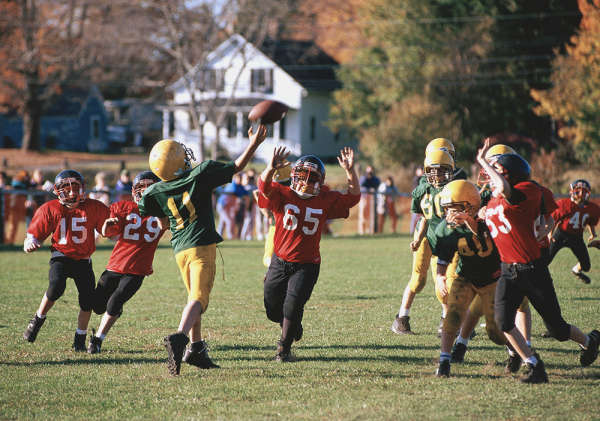The preteen and teenage years can be rough for a lot of kids. Their bodies are changing, their hormones are raging, and anxiety and depression can be a very real part of their existence.
In fact, a 2016 study in the journal Pediatrics found a 37 percent increase in the number of teens who have experienced major depressive episodes over the last decade.
Many of those kids aren’t getting the help they need either.
The Child Mind Institute reported that 60 percent of kids with depression are going without treatment.
Those are bleak numbers for any parent to consider — but what if there were a way to mitigate the chances your child might one day live with depression?
It turns out there may be.
Batter up!
Recent research found that involvement in team sports was correlated with a larger hippocampal volume (the area of the brain responsible for processing of long-term memory and emotional responses) in both boys and girls.
This is important because adult depression has actually been linked to a shrinking hippocampus in other studies.
In fact, the latest report did find a reduction in depression rates among boys ages 9 to 11 who were involved in team sports.
The findings make sense, according to Dr. Cynthia LaBella, chairperson for the American Academy of Pediatrics (AAP) Council on Sports Medicine and Fitness, and medical director at the Institute for Sports Medicine at the Ann & Robert H. Lurie Children’s Hospital in Chicago.
“Team sports provide regular aerobic activity, which is known to have beneficial effects on memory, cognition, and mood,” she told Healthline.
That same involvement can also provide kids with a social network of peers, while also instilling in them a sense of purpose, belonging, and achievement.
“All of which are protective factors against depression,” LaBella explained.
Team sports seem to be the key
The study involved 4,191 children between ages 9 and 11 and relied on parents to answer questions about their child’s participation in a variety of activities as well as any symptoms of depression.
The beneficial results weren’t found for non-sporting activities.
However, the study authors acknowledged this could be because participation in sports increases the hippocampus and decreases depression, or it could be that teens predisposed to depression may not be as interested in participating in sporting activities.
They say this is an area where more research may need to be done.
But Monica Jackman, an occupational therapist at Little Lotus Therapy in Port St. Lucie, Florida, can see why team sports may have provided a more noticeable positive impact.
“Team sports inherently foster development of social emotional inhibitory control and self-regulation skills as players must follow and remember game rules, take turns, cooperate and collaborate with teammates, build trust in teammates, and experience empathy for others during wins and losses,” she told Healthline.
But do those positive benefits extend to kids who may not be as naturally athletic?
Jackman explained that while “children with developmental coordination disorder have reported higher rates of loneliness and lower self-concept than typically developing children,” studies have shown that those same kids have been found to report less of that loneliness when participating in team sports even when their coordination difficulties may otherwise hold them back.


